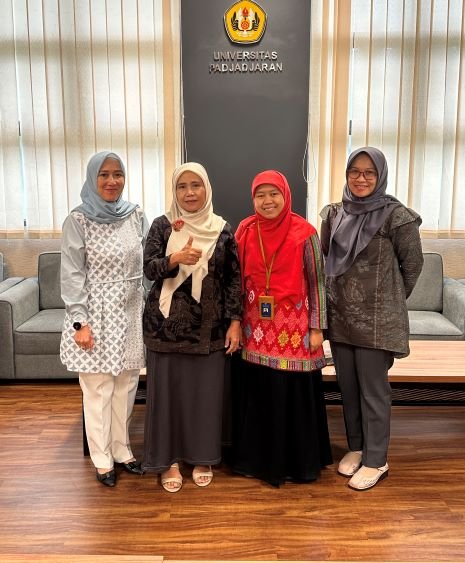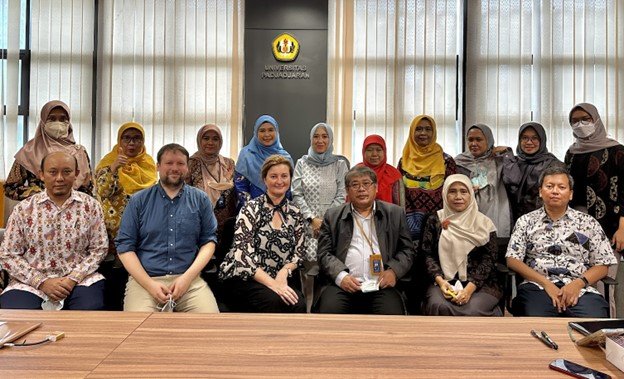|
Women in Science Mentoring Program (2020)
Parents’ knowledge, attitude, and health seeking behavior towards childhood TB during the COVID-19 pandemic
PI: Windy Rakhmawati, Universitas Padjadjaran, Indonesia
Project Dates: February 2022 - January 2023
Project Overview
 | PI Windy Rakhmawati, SKp, MKep, PhD, Sri Hendrawati, SKep, Ners, MKep, Prof Suryani, SKp, MN, PhD, and Nenden Nur Asriyani Maryam, SKep, Ners, MSN. UGM February 2023; Photo credit: Lina Stankute-Alexander (NAS) |
Indonesia is ranked second among countries with a high tuberculosis (TB) burden. During the COVID-19 pandemic, recommendations for people to stay at home reduced the community-wide transmission of COVID, but it may have facilitated household transmission of TB, as prolonged contact in the household is one risk factor for transmission. Inadequate social protection and health insurance, as well as severe economic contraction and loss of income, particularly among the most vulnerable populations, are likely to exacerbate some of the factors that influence the TB epidemic, particularly the prevalence of malnutrition. Stigma and fear of COVID-19 infection in healthcare facilities, as well as the similarities in some clinical features of TB (e.g., fever and cough) with those of COVID-19, might discourage people from visiting TB services, which eventually delay TB diagnosis and initiation of treatment.
Previous studies have shown that the prevalence of TB among children living in the same house with adult patients, or household contact, is higher than in the general population. TB diagnosis in children is challenging due to their immature immune system, and lack of knowledge and awareness of this disease interferes with prompt diagnosis and adherence to treatment.
This PEER project sought to identify parents’ knowledge about their child’s TB diagnosis, as well as parental attitudes towards child TB and health-seeking behavior during the COVID-19 pandemic. The project also included a mentoring component in which the PI helped facilitate personal and career development of junior women researchers.
Final Summary of Project Activities
The researchers surveyed 392 parents who had children with TB. Most respondents were unemployed, did not have health insurance, lived 1-5 kilometers from a health facility, and had children aged 1-3 years with TB. Just over half of the respondents had good overall knowledge of TB, but just under half had poor knowledge of the causes of TB, risk factors, symptoms, and signs. Nearly 90% of respondents already had good knowledge of TB treatment.
Almost all respondents considered TB a very serious disease, knew they had potential to contract it, and would tell doctors and other health workers about their child’s TB status. Almost all (92.4%) respondents brought their children who experienced TB symptoms to government health facilities services. The reasons respondents did not immediately take their children who experienced symptoms of TB disease to health facilities were financial constraints, difficulties with vehicles or distance to the clinic, and uncertainty about whether to go or not.
The PI Dr. Rakhmawati mentored two junior female researchers in the university. They took an active part in the research project, including collecting and analyzing data. The PI organized a regular monthly meeting to discuss their abilities, needs, and difficulties in the research project, as well as cover a range of professional development topics. These meetings covered time management, writing grant proposals, presentation skills, work-life balance, publishing internationally, and expanding their professional networking. The mentees have applied for a national grant in Indonesia to conduct new research.
 | | Staff from USAID (Aaron Burr) and NAS (Lina Stankute Alexander) visit three Women in Science Mentoring Program's grantee teams at Universitas Padjadjaran, Bandung, Indonesia, February 2023 |
Back to WSMP Grant Recipients
|
|
|
|





